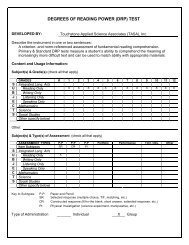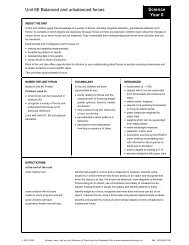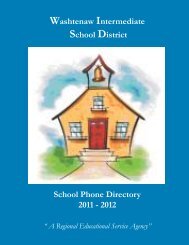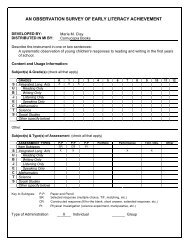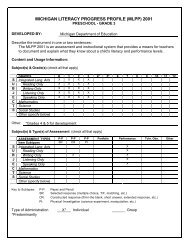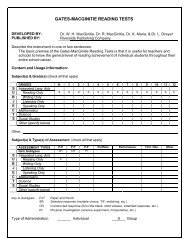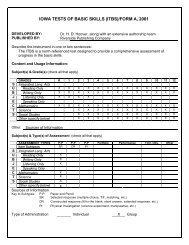Parent Advisory Committee - Washtenaw Intermediate School District
Parent Advisory Committee - Washtenaw Intermediate School District
Parent Advisory Committee - Washtenaw Intermediate School District
Create successful ePaper yourself
Turn your PDF publications into a flip-book with our unique Google optimized e-Paper software.
If a hearing officer requests an IEE as part of a hearing, the cost of the evaluation must be at public expense. Each public agency shall provide to theparent, on request, information about where an IEE may be obtained. When an IEE is at public expense, the criteria under which the evaluation is obtained,including the location of the evaluation and the qualifications of the examiner, shall be the same as the criteria which the public agency uses when it initiatesan evaluation to the extent those criteria are consistent with the parent’s right to an IEE.MediationMediation is available to all parties whenever a dispute arises with respect to special education, including but not limited to when a hearing is requested orwhen a complaint is made. The IDEA mediation requirements are:1. Mediation is free and voluntary, including cost of meeting to encourage mediation;2. Mediation cannot be used to deny a parent’s right to a due process hearing;3. Mediation must be conducted by a qualified and impartial mediator;4. The state must maintain a list of individuals who are qualified mediators who are knowledgeable about the laws and regulations on special education;5. Mediation shall be scheduled in a timely manner in a convenient location;6. Both parties must agree with the selection of the mediator;7. Parties who resolve the complaint through the mediation process shall execute a legally binding agreement;8. Discussions occurring during mediation must be confidential and may not be used as evidence in subsequent due process or civil proceedings; and9. Parties to mediation may be required to sign a confidentiality pledge before the mediation process begins.Impartiality of MediatorAn individual who serves as a mediator:1. May not be an employee of any local educational agency or any state agency;2. May not be an employee of a state educational agency that is providing direct services to a student who is the subject of the mediation process; and3. Must not have a personal or professional conflict of interest.Written AgreementA legally binding agreement executed as the result of the parties resolving the complaint through mediation shall:1. State that all discussions that occurred during the mediation process shall be confidential and may not be used as evidence in any subsequent dueprocess hearing or civil proceeding;2. Be signed by both the parent and a representative of the agency who has the authority to bind such agency; and3. Be enforceable in any state court of competent jurisdiction or in a district court of the United States.Impartial Due Process HearingA parent or a public agency may initiate a hearing regarding the public agency’s proposal or refusal to initiate or change the identification, evaluation, oreducational placement of the student, or the provision of a FAPE to the student. The alleged violation shall not have occurred more than two years beforethe date the parent or public agency knew or should have known about the alleged action that forms the basis of the due process hearing.The two-year time line shall not apply to a parent if the parent was prevented from requesting the hearing due to:1. Specific misrepresentations by the local educational agency that it had resolved the problem forming the basis of the due process hearing; and2. The local educational agency’s withholding of information from the parent that was required to be provided to the parent.When a due process hearing is initiated, the public agency shall inform the parent of the availability of mediation.A parent must give notice to the public agency, as appropriate, when filing a request for a due process hearing. The notice request must contain thefollowing information:1. The name of the student, address of residence of the student, (or available contact information in the case of a homeless child or youth), and the nameof the school the student attends;2. A description of the nature of the problem, including related facts; and3. A proposed resolution of the problem, to the extent known and available to the parent at that time.A parent may not have a due process hearing until the parent, or the attorney representing a parent, provides a due process hearing notice that includes theabove information to the other party and forwards a copy of such notice to the State Educational Agency.This notice must remain confidential.A model form is available at the ISD to assist the parent in filing due process hearing requests.A hearing will be conducted by the public agency directly responsible for the education of the student.The public agency shall inform the parent of any free or low-cost legal and other relevant services available in the area if the parent requests the informationor the parent or the public agency initiates a due process hearing.Subject Matter of HearingThe party requesting the due process hearing shall not be allowed to raise issues at the due process hearing that were not raised in the filed due processnotice unless the other party agrees otherwise.Resolution SessionPrior to the opportunity for an impartial due process hearing, the local educational agency shall convene a meeting with the parents and the relevantmember(s) of the IEP Team who have specific knowledge of the facts identified in the complaint. The meeting shall:1. Occur within 15 calendar days of receiving notice of the parent’s complaint;2. Include a representative of the agency who has decision-making authority on behalf of the agency;3. Not include an attorney of the local educational agency unless the parent is accompanied by an attorney;34




